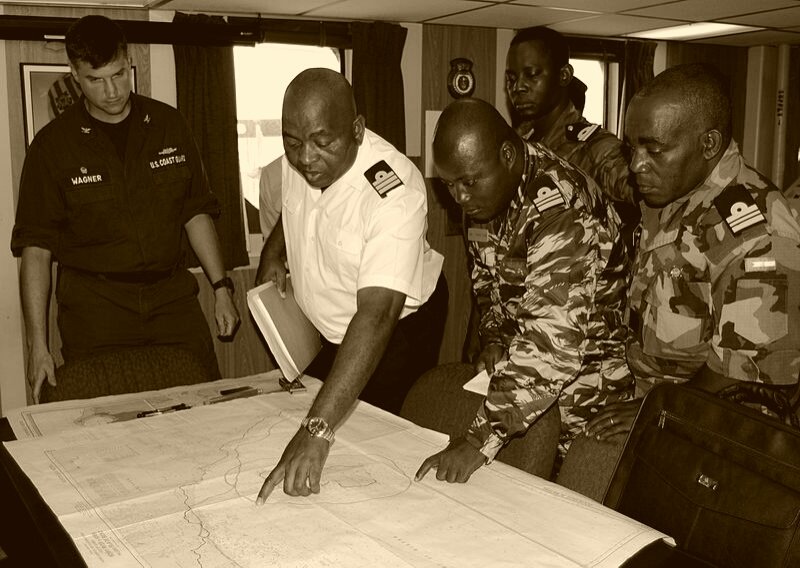Nigeria’s military might was at its peak in the 80s and 90s. In 1991 the Nigerian armed forces had an active duty personnel of some 130,000 men. The army Structured into four divisions to accommodate the formation of an airborne division in 1991.
The First Mechanized Infantry Division was headquartered at Kaduna. The Second Mechanized Infantry Division was headquartered at Ibadan. The Third Armored Division was based at Jos, with one mechanized and two armored brigades. The 82nd (Airborne) Division was stationed at Enugu
As tensions simmered in the disputed Bakassi Peninsula the Nigerian army created three brigades (airborne, airmobile, and amphibious) specifically to defend the Cameroon border and for other foreign commitments. This force was later reinforced with an artillery and
engineering brigade and a reconnaissance battalion as war with Cameroon seemed imminent. The army was equipped with tanks and other armored vehicles, and with artillery of various kinds. Plans were under consideration for the creation of an army light aviation force, for which
American Bell 412 helicopters were being considered. It was not clear whether this was to be part of the new airborne brigade, or another unit.The Nigerian government was however taken by suprise when intelligence reports revealed South Africa was
in talks with Equatorial Guinea for the establishment of a South African naval base in the country. A nightmarish scenario with Equitorial Guinea becoming Nigeria& #39;s Cuba stared the Babangida regime in the face.
There was no love lost between Nigeria and South Africa and for good reasons. Nigeria has been in the vanguard of African support for the liberation of southern Africa and defense of the frontline states and a fierce critic of the Apartheid regime.
Concerned about South Africa’s attempt to gain a foothold in Nigeria’s “soft underbelly” in Equatorial Guinea, the Nigerian army established a rapid deployment force to be used for any contingency, particularly in relation to neighboring African countries.
This unprecedented formation was to deter such actions in the future, and to ensure combat readiness for any foreign contingency. As neighbouring countries raised an alarm over this development the Nigerian government stressed that the force was not intended to intimidate
Nigeria’s neighbors, but to fight external and internal threats. To allay fears, the Nigerian government proposed ECOWAS member states sign a mutual defense pact with Nigeria for military response against attack from non-ECOWAS countries.
Only Nigeria’s armed forces had the size, experience, equipment, and logistical resources to provide or serve as the core of an ECOWAS rapid deployment force Nigeria argued. On the other hand, ECOWAS members were spooked and wary of Nigeria’s aspirations to regional dominance.
Many francophone states had long-standing military aid and security agreements with France, and seven of them were already parties to a mutual defense pact with Paris. At this point the self styled tactician IBB decided to take a hardline posture on activities of non ECOWAS
..states in the region in the hopes an assertive Nigeria will dissuade any kind of military adventurism against the nations interest. In May 1991 an Italian ship dumped toxic industrial waste at the port of Koko in Benin Republic. The Nigerian Navy evacuated the local population
and seized the ship until the waste was removed by the Italian government. In October, Nigeria ordered out of its territorial waters a Greek ship allegedly carrying frozen meat contaminated by nuclear fallout from Chernobyl, Soviet Union.
That same month he warned that if Equitorial Guinea allows itself to be used as a staging ground for an attack against Nigeria’s interest, the Nigerian military will have no choice than to take retaliatory action to secure its perimeter.
At the eleventh ECOWAS summit chaired by President Babangida, members agreed to make the dumping of toxic and nuclear waste in the region a criminal offense and approved a Nigerian plan to set up a “dump watch” alert and information-sharing system. IBB also urged ECOWAS states
to set up mechanisms to counter smuggling. The message was clear. Equatorial Guinea will not be Nigeria’s Cuba. Tensions simmered, the South African military presence in the country never materialised and Nigeria went back inward focusing on domestic policies.

 Read on Twitter
Read on Twitter



